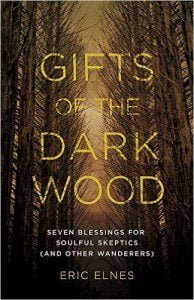
In preparation for Eric Elnes’ visit to Portland to appear live on the Homebrewed CultureCast October 1st, I got some insight into what he calls his “best book yet,” “Gifts of the Dark Wood.” In it he offers a spiritual guidebook to navigating faith and seeking God in a postmodern world.
As always, Eric offers some surprising – some might say controversial insights, like why we don’t need to fear hell, why we need failure, and why getting lost is a necessary part of our spiritual growth.
Join us to meet Eric Elnes LIVE Thursday, October 1 in Portland, and get a signed copy of his book FREE with admission, along with some other goodies. In the meantime, here’s some of the conversation we shared.
Dante famously portrayed the “Dark Wood” as a purgatory to be feared in his Divine Comedy. You say it can actually be a place of awakening and discovery. How so?
Thanks to Dante Alighieri, the Dark Wood has been misunderstood in the West for the better part of the last millennium. “In the middle of the road of my life’s journey,” Dante wrote, “I awoke in a Dark Wood where the true way was wholly lost.” To him, the Dark Wood was a place of struggle and uncertainty that must be avoided at all costs before it leads you to the gates of hell. Yet another side of the Christian tradition, represented especially by the ancient mystics, understood struggle not as punishment for sin, but as the central context in which revelation takes place. The Dark Wood is where you meet God.
While the Dark Wood was called by various names by the mystics, all of them insisted that the Dark Wood is a place where one receives strange and wondrous gifts whose value vastly exceeds whatever hardships are encountered there. The mystics taught that in the Dark Wood you discover who you are and what your life is about, flaws and all. You bring all your shortcomings with you, not in order to purge them or be judged by them, but to embrace them in such a way that your struggles contribute meaningfully to the central conversation God is inviting you to have with life.
Why are experiences of failure to be embraced rather than avoided or quickly forgotten?
Speaking at a TED Conference, scholar and author Brené Brown once observed, “You know what the big secret about TED is? This is like the failure conference … You know why this place is amazing? Because very few people here are afraid to fail. And no one that gets on this stage so far that I’ve seen has not failed.
None of us like to fail. But the fact of the matter is that no matter what we do in this life, no matter how hard we work or what we believe, we will regularly encounter failure. The sooner we let go of the notion that there’s some sort of “silver bullet” out there that will ensure that life will never hurt us – that the rug will never be pulled out from under us again and that the bottom won’t drop out – the sooner we start to discover the gifts that experiences like failure bring.
You suggest Jesus valued “right failure” over “right belief.” Explain.
Did Jesus not rename his disciple Simon to Peter, which means Rock, after sinking like a rock in the Sea of Galilee when he attempted to walk on water? Shortly thereafter, we find Jesus announcing to his disciples, who must have been laughing uproariously over Simon’s renaming to Rock, “upon this Rock I will build my church” (Matthew 16:18). If you miss the irony that Jesus sought to build his church on the sinking Rock of Peter, you also miss the crucial implications for the community he intended to form.
So often Christians seem to feel it is their responsibility to build the church on a firm and unshakable foundation. But Jesus seems to want to build his church on a sinking rock.
Sometimes it takes a journey into darkness, even deep darkness, to finally awaken to the smallness of our success-based world. Sometimes you need to lose your way in  order to discover the grandeur, mystery, and freedom of the world that awaits you. Sometimes, even, you need to step away from the security of your boat onto the stormy sea of your own awakening to discover that a sinking stone is a far firmer foundation than you have imagined. There’s no firmer foundation than the awareness of being grasped and upheld by a strong hand at the very moment when you thought all was lost. Jesus sought to build his community at the intersection of human cry and divine embrace.
order to discover the grandeur, mystery, and freedom of the world that awaits you. Sometimes, even, you need to step away from the security of your boat onto the stormy sea of your own awakening to discover that a sinking stone is a far firmer foundation than you have imagined. There’s no firmer foundation than the awareness of being grasped and upheld by a strong hand at the very moment when you thought all was lost. Jesus sought to build his community at the intersection of human cry and divine embrace.
What can we learn from the ancient Christian mystics’ understanding of struggle?
One of the great lessons you learn in the Dark Wood is that struggle and challenge provide one of the most reliable contexts in which to discover your path in life, or find your way back when lost. If you’re paying attention rather than looking for the nearest way out of the Dark Wood, you discover that your way forward is revealed by a special set of markers, which I like to call “sweet spot” moments.
Golf clubs, baseball and cricket bats, and tennis rackets all have sweet spots. Human lives do, too. The sweet spot on a tennis racket is that place near the center of the strings where the vibrations transmitted through the impact of the ball cancel themselves out, making players nearly unaware that the impact has occurred. Hitting the sweet spot, therefore, feels natural and almost effortless. Just as the sweet spot of a racket is found by adjusting to continuous impacts made by a ball moving in the opposite direction, so your internal sweet spot tends to be revealed though direct challenge. You keep adjusting your responses until they begin coming from a place where you feel most fully yourself—most fully free, yet wholeheartedly engaged and alive.
“Sweet-spot” moments act like homing signals indicating your internal true north. In this respect, the Dark Wood is a sacred space where you not only meet God, but meet yourself—your true self that is most directly connected to, and in conversation with, the divine.
Surprisingly, your chapter on temptation isn’t so concerned with greed, gluttony or envy as one might expect. What kind of temptation is actually a spiritual gift?
For most of us, our greatest temptation that keeps us from following our life’s path – by far – is not to do evil, but to do good. Doing the wrong good, however, is entirely the problem. By the wrong good I mean any good work that is not yours to do. It may be someone else’s good to do, but not your own.
The reason the Dark Wood gift of temptation is so important is that it produces results—like exhaustion—that reveal fairly quickly whether you are on a path that is central to who you are and what you’re here for or are on a side path. Logic and reason will say, “Think of all the good you’re doing working here! And when you retire you can do anything you want!” Of course, by the time many people retire they are so used to doing what everyone else wants of them that they have lost all concept of who they are and what they want—or how to say no. So instead they pick up a television remote in one hand and a golf club in the other and call it “the good life.” It seems like the most “reasonable” thing to do.
Finding your distinctive path in life requires instinct and imagination. It’s a bit like walking in the dark. In a very real sense, you do not find your path. Your path finds you.
What are some of the other gifts of the Dark Wood that you identify in the book?
In my book I trace seven unusual gifts found in the Dark Wood. These gifts have been recognized throughout the ages but have been largely lost on modern society in its fear of heading precisely into the territory we explore:
- emptiness
- uncertainty
- getting lost
- being thunderstruck
- temptation
- disappearing
- becoming a misfit
These gifts may appear more like curses than blessings. Certainly they did to Dante. Yet before you dismiss them out of hand, ask yourself, “Do I ever experience any of these?” Some people find themselves in the Dark Wood when they wake up one day and realize that the career that has provided a healthy paycheck for years has also been sucking the life out of them. Others find themselves there when tragedy strikes, or a marriage fails, or a serious health threat arises, shaking their confidence in God’s goodness or God’s very existence. Some enter the Dark Wood when their beliefs—or doubts—set them at odds with their friends or faith community. They can no longer bring themselves to pray the prayers or recite the creeds because their internal dissonance meter has gone off the charts. If any of these experiences describe you, then if the mystics are right, you are in the best possible position to experience profound awakening and insight about who you are and what you are doing here.
Explore a video series produced for the book, available on DVD and as a downloadable streaming video online at www.darkwoodbrew.org.
Buy tickets to the Homebrewed CultureCast Live with Eric Elnes in Portland, OR Thursday Oct 1 HERE. Seats are limited.
















